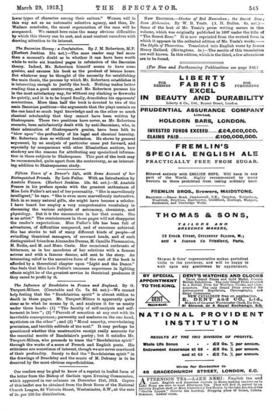The Baconian Heresy : a Confutation. By J. H. Robertson,
M.P. (Herbert Jenkins. 21s. net.)—The sane reader may feel more than a moment's doubt as to whether it can have been worth while to write gx hundred pages in refutation of the Baconian theory. Indeed, Mr. Robertson himself seems to have some qualms, and excuses his book as the product of leisure hours. But whatever may be thought of the necessity for 'establishing the main thesis, the process by which Mr. Robertson establishes it is interesting enough to justify the book. Nothing makes better reading than a good controversy, and Mr. Robertson pursues his in the most satisfactory way, for without any slashing or fireworks he quietly, and it is to be hoped finally, demolishes his opponents' contentions. More than half the book is devoted to two of the main Baconian positions—the arguments that the plays contain on the one hand so much legal knowledge and on the other so much classical scholarship that they cannot have been written by Shakespeare. These two positions have never, as Mr. Robertson remarks, been satisfactorily dealt with by anti-Baconians, who, in their admiration of Shakespeare's genius, have been loth to "blow upon" the profundity of his legal and classical learning. Mr. Robertson does so without hesitation. He shows by general argument, by an analysis of particular cases put forward, and especially by comparisons with other Elizabethan authors, how shadowy are the reasons for attributing any specialized informa- tion in these subjects to Shakespeare. This part of the book may be recommended, quite apart from the controversy, as an interest- ing addition to Shakespearean study.










































 Previous page
Previous page